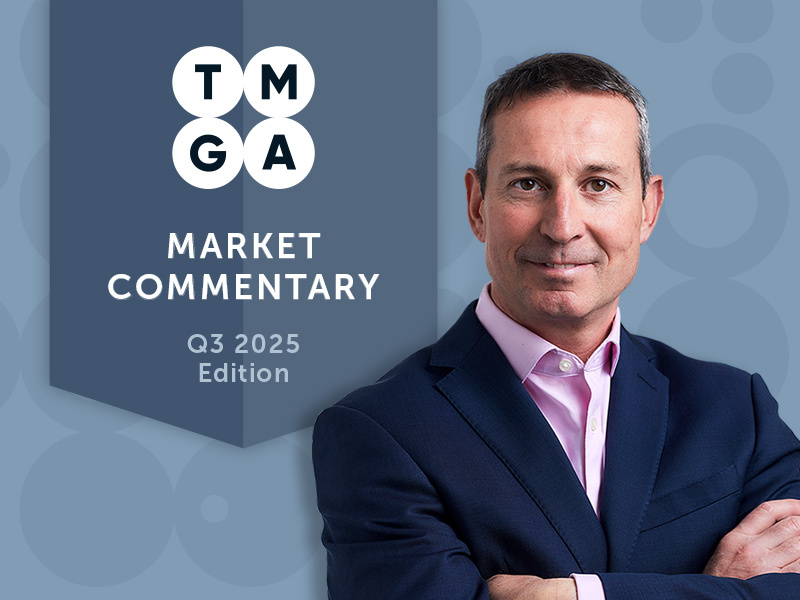

PROLOGUE: Q2 2025 begins with worse-than-feared announcements on global tariffs from the Trump administration, triggering indiscriminate selling across global equity markets. Our Q1 market commentary provides context for understanding the current environment and where opportunities and challenges may lie ahead amid investors widening their focus away from the Magnificent Seven, and increasing concerns regarding disruptions to supply chains and the subsequent impact on global trade.
In addition, frequent impactful announcements made by the Trump administration fuelled global market volatility. While potential resolution to the war in Ukraine offers optimism, negative rhetoric towards Europe spurred major announcements in the Eurozone’s planned defence spending. Germany’s new coalition plans to relax debt rules, unlocking billions for infrastructure projects and defence. The EU also announced up to €800 billion in additional national spending, including €150 billion in defence loans. Meanwhile France’s political climate also improved following last Summer’s snap election debacle. These shifts have altered global equity market leadership, with US markets and the US dollar down year-to-date, while Europe, the UK, and China have performed well.
European equities have outperformed due to previous low economic expectations, leading to more earnings upgrades than downgrades, in contrast to the US, where we previously highlighted expectations were elevated, particularly in the Magnificent Seven technology mega caps. While US financial conditions have already eased, the Eurozone remains tight, but moderating inflation increases the likelihood of continued ECB rate cuts. Conversely, recent Fed minutes highlighted upside inflation risks from ‘possible effects of potential changes in trade and immigration policy’.
European equities have outperformed due to previous low economic expectations, leading to more earnings upgrades than downgrades, in contrast to the US, where we previously highlighted expectations were elevated, particularly in the Magnificent Seven technology mega caps.
The UK may benefit from Trump signalling exemption from the most onerous import taxes. The positive meeting between Trump and Starmer raised hopes for a trade deal, given the UK’s modest trade surplus with the US. This was recently followed up with ‘productive negotiations’ about a deal between the UK and US which will ‘continue at pace’. Despite Labour’s weak start, the UK’s stable government, mergers and acquisitions, returning foreign investors and record share buy backs, continue to position it as a value focused market.
Emerging markets also saw a rotation, where previously driven by India, China is now outperforming, although the stagnant property market continues to cause a drag on consumers, given the high level of domestic ownership. President Xi’s recent meeting with tech leaders including Jack Ma suggests a softer stance toward private enterprise, which markets have taken positively. Since tariffs were first introduced in 2018, China has focused on growing exports in other global markets, for instance BYD recently surpassed Tesla revenue despite limited sales in the US.
In the tech sector, Chinese firm DeepSeek caused excitement and volatility with its affordable Language Learning Model, disrupting the AI landscape but accelerating overall development. This development may bring forward some of the expected productivity gains from AI, which is crucial after the large and ongoing investment by the Magnificent Seven. Although healthcare has sold off since the US election, this sector is expected to be a major beneficiary of AI advancements as the technology continues to evolve and valuations remain attractive.
US valuations, driven by the technology sector, remain elevated and vulnerable to corrections as recently witnessed, but while growth in this sector may moderate, earnings are still expected to outpace the broader US market. Medium-cap US equities, following recent volatility tied to recession fears, now appear attractive if Trump’s policies succeed. Meanwhile, the equal-weighted S&P has been more defensive than its tech-heavy counterpart.
In certain areas of fixed income, investors are being rewarded with attractive yields, supported by solid credit quality and low default risk. Gold continues to offer a hedge against increasing geo-political uncertainty, supported by Central Bank buying and general risk aversion.
We remain vigilant for signs of any material slowdown caused by increased economic, fiscal and geo-political uncertainty arising from the Trump administration policies. Following a strong Q4 rally, the US dollar weakened as rate cut expectations shifted from none to three this year, and rate expectations continue to remain volatile. Given the uncertainty around global tariffs, we feel maintaining material sterling-hedged exposure remains prudent as part of our capital preservation mindset.
In certain areas of fixed income, investors are being rewarded with attractive yields, supported by solid credit quality and low default risk. Gold continues to offer a hedge against increasing geo-political uncertainty, supported by Central Bank buying and general risk aversion.
As we previously highlighted elevated valuations remain concentrated in US mega-caps, particularly in the technology sector, where investor enthusiasm and strong earnings growth have driven prices higher. In contrast, European, UK, and emerging market equities continue to trade at historically lower valuations. However, these undervalued markets present opportunities from a potential broadening of returns. With global diversification becoming increasingly relevant, in the near term, investors are looking beyond US mega-caps for more balanced long-term growth.




